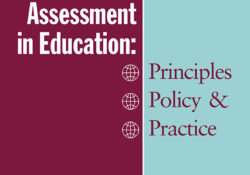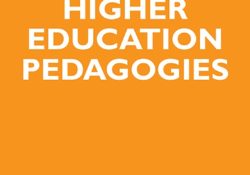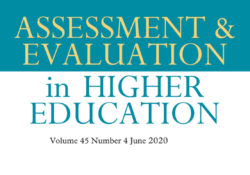tandfonline.com har udgivet en rapport under søgningen “Teacher Education Mathematics”: ABSTRACT ABSTRACT Feedback is dependent on how it is interpreted and used. The present study aimed to explore Swedish primary-school teachers’ and students’ shared concerns regarding classroom feedback interaction. 13 teachers and 23 students (7–9 years old) were interviewed. A grounded theory design was employed for coding and analysis. According to the findings, teachers’ and students’ mutual main concern was to construct clarity regarding what the other communicated. Both strived to construct clarity concerning conditions that they had to adapt to, from aspects as trustworthiness and understanding. The study contributes with an illustration of the relational aspect of classroom feedback in primary school. Link til kilde
Like this:
Like Loading...

tandfonline.com har udgivet en rapport under søgningen “Teacher Education Mathematics”: ABSTRACT ABSTRACT Teacher dashboards provide real-time information about students’ performance and progress, which help K-12 teachers to adjust feedback to student’ specific needs during learning. Prior research indicated two problems with respect to how teachers provide feedback: (i) teachers do not always select the most effective feedback to support student’ learning and (ii) feedback is not allocated equally to students with different abilities. Specifically, process feedback is considered most effective yet is relatively scarce. In order to understand how dashboards influence the type and allocation of feedback, we compared characteristics of feedback given after dashboard consultation (dashboard-prompted feedback) to feedback triggered by teachers themselves or in response to students’ questions (human-prompted feedback) in thirty-five K-12 classrooms. Results showed that dashboards… Continue Reading →
Like this:
Like Loading...
tandfonline.com har udgivet en rapport under søgningen “Teacher Education Mathematics”: ABSTRACT ABSTRACT Through an extended commentary on the empirical articles in this special issue ‘Signature Assessment and Feedback Practices in the Disciplines’ we elaborate the concepts of signature assessment and signature feedback practices by developing a new taxonomy of their elements. We propose that signature assessments focus on conceptual, epistemological, social, material and/or moral dimensions of the discipline. We also propose four discipline-specific sources of feedback information, particularly highlighting what we are calling consequential feedback, which can be generated by users of disciplinary knowledge or objects. Finally, we identify three levels of feedback timings that can support students’ use of feedback information: rhythms, cycles, and spirals. Based on gaps in the literature in relation to this taxonomy, we identify areas… Continue Reading →
Like this:
Like Loading...
eric.ed.gov har udgivet: No one is satisfied with science education in the U.S. today. One need only look at Trends in International Mathematics and Science Study (TIMSS), Programme for International Student Assessment (PISA), and National Assessment of Educational Progress (NAEP) data to see what a mediocre job is being done of imparting a solid science education to the average American student. There are multiple reasons for this failure, not least the poor preparation of too many teachers whose job it is to teach this critical subject. One key explanation is the poor quality of academic expectations and standards themselves. In science–perhaps even more than other subjects–states must honor their responsibility to set forth, explicitly and rigorously, the skills and content that schools are expected to impart and students are expected… Continue Reading →
Like this:
Like Loading...
tandfonline.com har udgivet en rapport under søgningen “Teacher Education Mathematics”: ABSTRACT ABSTRACT This study compared the effects of worked example and scripting on students’ argumentative peer feedback, essay and learning qualities. Participants were 80 BSc students who were randomly divided over 40 dyads and assigned to two experimental conditions (worked example and scripting). An online peer feedback environment named EduTech was designed and students were tasked with writing an argumentative essay, engaging in peer feedback, and revising their essay. The results indicate that students in the scripting condition benefited more than students in the worked example condition regarding peer feedback quality. Furthermore, the scores of students in both conditions improved from pre-test to post-test in terms of argumentative essay writing and learning. This difference was significant, however, between the two… Continue Reading →
Like this:
Like Loading...
tandfonline.com har udgivet en rapport under søgningen “Teacher Education Mathematics”: Link til kilde
Like this:
Like Loading...
tandfonline.com har udgivet en rapport under søgningen “Teacher Education Mathematics”: ABSTRACT ABSTRACT Teacher feedback can be described as a complex interactional pattern between teacher and student. Formative outcomes of assessment are considered to be enhanced when students understand aims and criteria. In order to better understand the processes of teacher feedback and to improve teaching and classroom assessment, there is a need for research on students’ perspectives on feedback. The present study aims to conceptualise how primary-school students construct meaning from teacher feedback. The study was based on focus group interviews with 23 students in grades 2 and 3 (7–9 years old). Constructivist grounded theory was used throughout the study. According to the findings, primary-school students conceptualise teacher feedback as communicating a lot of “musts”, centred on learning, involving what the… Continue Reading →
Like this:
Like Loading...

tandfonline.com har udgivet en rapport under søgningen “Teacher Education Mathematics”: ABSTRACT ABSTRACT This study focuses on the quality of teacher–student interactions and feedback in teaching English as a foreign language (EFL). Data consisted of 65 video-recorded lessons from 13 classrooms in two lower-secondary schools, and were coded with Classroom Assessment Scoring System–Secondary. Four cases were selected and analysed for feedback practice based on teachers’ use of first language (L1: here, Norwegian) and target language (L2: here, English) in EFL lessons. Teacher–student interactions were characterised by mid quality of emotional support and high quality of classroom organisation, but relatively low quality of instructional support. The results revealed an interdependence between quality of feedback and instructional dialogue, yet there appeared to be difficulties in supporting students’ internal feedback and self-regulation. Engaging in extended… Continue Reading →
Like this:
Like Loading...
tandfonline.com har udgivet en rapport under søgningen “Teacher Education Mathematics”: ABSTRACT ABSTRACT Technical writing skills are vital to professional engineers, but many engineering students find them difficult to master. This paper presents a case study carried out among ~300 first and second year engineering students who had little previous experience in technical writing. The aim was to support them to write better technical reports. Students were asked to write an 800-word report following an experimental laboratory and to include written reflection on their work. This improved writing skills (as measured by mark awarded and by questionnaires completed by students before and after the activity) by encouraging self-regulation and had the additional benefit that students were more satisfied with and engaged with the feedback they received on their work. Link til… Continue Reading →
Like this:
Like Loading...
tandfonline.com har udgivet en rapport under søgningen “Teacher Education Mathematics”: Abstract Abstract There is an increasing focus on notions of feedback in which students are positioned as active players rather than recipients of information. These discussions have been either conceptual in character or have an empirical focus on designs to support learners in feedback processes. There has been little emphasis on learners’ perspectives on, and experiences of, the role they play in such processes and what they need in order to benefit from feedback. This study therefore seeks to identify the characteristics of feedback literacy – that is, how students understand and can utilise feedback for their own learning – by analysing students’ views of feedback processes drawing on a substantial data set derived from a study of feedback in… Continue Reading →
Like this:
Like Loading...








